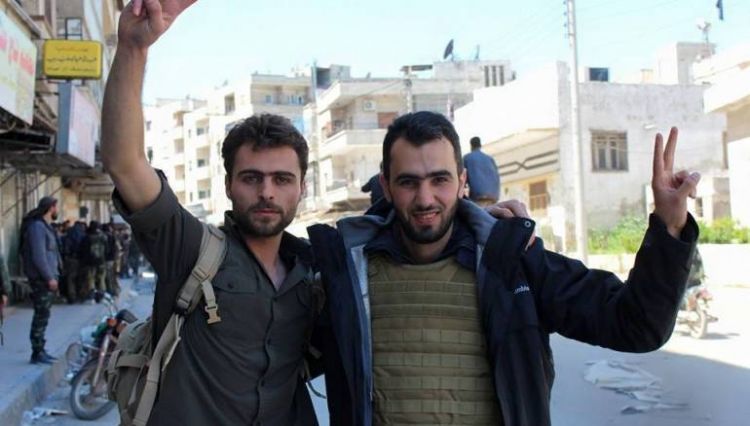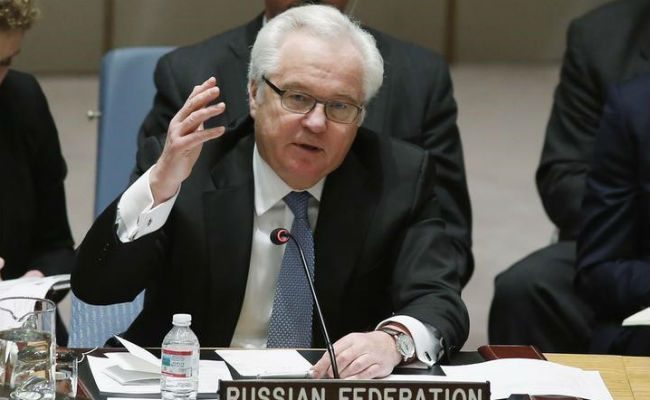
The dangers involved in reporting from Syria has led to most international outlets suspending operations in the country, leaving it to local journalists and freelancers to supply video footage and reports.
The crisis in Syria has killed 95 foreign and local journalists since it started in 2011, according to the Committee to Protect Journalists (CPJ).
Journalists reporting in the country face threats from the Assad government and various factions, including the Islamic State of Iraq and the Levant (ISIS) group and al-Nusra Front. However, Assad regime killed the most of the journalists in Syria.
Hadi Abdullah is one of these civilian journalists. He is an independent media activist and journalist in Syria. In 2011, he left nursing school to participate in the peaceful protests of Homs and began his new career: reporting stories from the front lines in Syria. Hadi is prominent peaceful activist and has become an icon with his persistent ideas of hope and unity. He is the winner of the Reporters Without Borders 2016 Press Freedom Award.
However, his choices and career made him under grave danger, as he faced many murder attempts and lost two of his best friends during that.
On June 14, 2016, Hadi Alabdullah and photographer Khaled al-Eissa rushed to the scene of a barrel bomb attack. As they were reporting from the scene, a second barrel bomb hit the same location—a tactic known as the “double-tap.” They survived.
Just two days later, an assassination attempt was made on Hadi’s life. An IED was planted in the residential building in which they had been staying during his time reporting in Aleppo. After being buried under the rubble for approximately 40 minutes, Hadi had sustained extensive injuries to his legs, stomach, and head, and underwent many surgeries over the course of several weeks. His best friend and photographer, Khaled, did not make it. Khaled died from the injuries, shrapnel to the head, after a week of being in critical condition.
After Hadi’s first mate Trad al-Zhouri, Khaled is the next one to die in an attack while Hadi survives.
Hadi mourned Khaled on his accounts, saying “What can my wounded body do? what can my dying soul do in the presence of this news?”
“I hope I was in your place, or with you.. I don’t want to live after you.. tell your soul to take mine with it.”
ماذا عساي أن أفعل الآن .. هيا يا خالد فروحي تنتظر روحك.. pic.twitter.com/W53sK6xT4c
— هادي العبدالله Hadi (@HadiAlabdallah) June 25, 2016
After months of silence, Hadi chose to speak and tell his tragic story.
Perhaps now, I will be able to speak—able to describe some of what happened. I’m beginning to be sure that I am still alive and did not die.
I never imagined that one day, the roles would switch. I, the one who captured tens of videos of Syrians being pulled from under the rubble, suddenly became the event instead of the reporter.
At around a quarter before midnight, I arrived with Khaled, my dear friend—may God rest his soul—to our residence in the al-Sha’ar neighborhood in Aleppo.
We stopped to talk to some of the neighbors sitting on the balconies of their homes, then I told Khaled that I would head back to the apartment. I walked ahead of him; soon after, he began to walk behind me by about four or five meters, as far as I can remember.
I entered the corridor of the building where we lived. It was dark and narrow with various water and electricity meters for the residents.
I never imagined what was waiting for me. I didn’t hear an explosion or any other sound. I was aware only of being suddenly and completely surrounded from all sides with rocks, metal, and dirt—unable to move at all.
There was a very small opening for air near my nose and mouth, through which I tried to keep breathing. I could feel water leaking around me, then began to feel unbearable waves of pain through most of my body, especially my head. The pain intensified. I tried to yell from under the rubble.
No one crossed my mind other than my dear friend. No one crossed my mind other than the one who would be willing to sacrifice his life for mine, the one for whom I feared more than I did for myself and my family.
I yelled, “Khaled, Khaled, I’m here Khaled! Tell them to turn off the electricity.”
Khaled had been behind me by several meters and hadn’t even entered the building. That’s why I hadn’t expected Khaled to fly several meters from the blast of the explosion—knocked unconscious by the shrapnel that had penetrated his head.
I continued to yell, “Khaled, Khaled can you hear me?! I’m here! Tell them to turn off the electricity!”
The electricity wires that ripped and scattered from the explosion continued to run electric currents through my body, still buried under the wreckage.
I yelled again, my voice fading, “Whoever can hear me, turn off the electricity…”
When I began to lose hope, a voice sounding like Khaled’s came to me. “Okay, we are turning it off.”
The electric shocks slowly began to diminish until they stopped entirely. At this point, I felt some relief. When my body began to relax, I tried to yell once again. I couldn’t. I had completely lost all of my strength. I said the shahada—the Islamic testimony of faith to God, said to reaffirm one’s faith before dying—twice and began to wait for the moment I would leave this world.
I slept—or maybe I blacked out, I’m not sure. I could no longer feel what was going on around me. I woke up shortly to the sound of Syria Civil Defense members digging away the rubble from around me.
Minutes passed, one after the other, as if they were years. I began to feel the weight being lifted off of my body, piece by piece.
Rocks were removed from my shoulders, one by one, then from my feet, stomach, and chest. Here, I realized that my head was stuck between two sheets of metal or hard rocks—I can’t remember exactly.
After a short while, I felt my whole body get very hot. I tried to open my eyes; with effort, I was able to open them to see that I was being carried on a stretcher. I looked around at the faces surrounding me, but I did not see Khaled. I blacked out. I woke up the next day after several surgeries to my legs and stomach.
I looked at the people around me—the doctors and nurses that had saved my life like angels. As soon as I caught their eye, I asked them, “Where’s Khaled? Is he okay?!”
I could see the fear and pity in their eyes. This is how they treat all of their patients; despite their personal tragedies, their hearts still have kindness for all of the injured.
We exchanged looks as I gathered my strength and tried to speak. It was as if the words were refusing to come out of my mouth. Was it a side effect of the anesthetics or was it the fear of what they might tell me? It wasn’t important. I gathered my strength and the first thing I could say was, “Strange… where’s Khaled? I don’t see him! Is he okay?”
I didn’t get an answer. They stood without saying a single word. I tried to gather an answer from the expression of their eyes, but couldn’t.
One of them answered me, “He is okay, but… he’s injured.”
I blacked out for a few minutes and woke up again. “Guys, for the love of God, let me know about Khaled. Why are you standing next to me? I’m well. I’m fine. Go check on Khaled, please.
After that, I gathered from their conversations that Khaled’s injury was severe and he was fighting for his life.
I would rather be cut into a thousand pieces rather than hear such news.
With my tired imagination, I began to replay the painful scenarios I had lived.
I remembered the tragedy of when I lost another friend—Trad—may God rest his soul.
Trad was the dear friend who had accompanied me for three years of the revolution. He was always with me, just as a shadow follows its owner, or like a soul with its body.
We were close, inseparable companions in this war. I thought we would live together and die together.
All these painful details came back to me because Trad had also been wounded by shrapnel to the head, fighting for his life for about a week before he died. May God have mercy on him.
His death was the biggest personal tragedy I had ever suffered. It was as though I had lost a part of myself; despair filled my life.
And then, Khaled came into my life and lifted up my spirits. We bonded in a similar way to how Trad and I had—companions in this war, completely reliant on each other. My friendship with Khaled filled the hole in my heart that had emerged when Trad died.
Khaled is now experiencing what Trad had experienced, may God have mercy. They were similar even in their injuries—both suffering shrapnel to the head.
I struggled with the thoughts and memories in my bloodied head. Will I face the same tragedy? Will I again lose a part of myself?
The doctors decided we should leave Aleppo for Turkey to complete treatment.
That day, there was only one road connecting Aleppo to the outside—Castello Road.
On a daily basis, the road would incur heavy shelling and sniper attacks.
The ambulance drove quickly on the dirt path adjacent to Castello in order to avoid the shelling.
This is what life is like for paramedics in my country. At every moment, they are risking their lives to save those of others.
The tire blew out and I fell from the stretcher more than once; pain shot through me each time.
However, it was not the pain of my body that was hurting, but my concern for the wounded in the other ambulance.
Will Khaled live? Or will he die, leaving me alone with only my memories?
We arrived at the Syrian-Turkish border, entered into Turkey, and were then transferred from hospital to hospital until we were able to settle in one.
I underwent more surgeries. My dear friends, who never left my side during the process, told me that after each surgery and before waking up from under the anesthesia, I would mutter the words, “Oh Lord, take my life and give it to Khaled. Oh Lord, take my life and give it to Khaled.”
I remained this way until the news I had been dreading came.
“Khaled joined Trad. Khaled has died.”
My God, how hard it was to hear those words. It was more difficult than being buried under the rubble—more painful than my physical wounds. I felt as though I had died as well.
Those who have lost one dear to them will understand. What I felt was beyond descriptions of pain and sadness. It was like time stood still.
This is how I was killed a second time. Dear readers, it was not the type of death where the person is buried in the ground. Losing those most dear to you is like dying yourself, like being buried alive.
That is how I felt. Dead but still alive.




